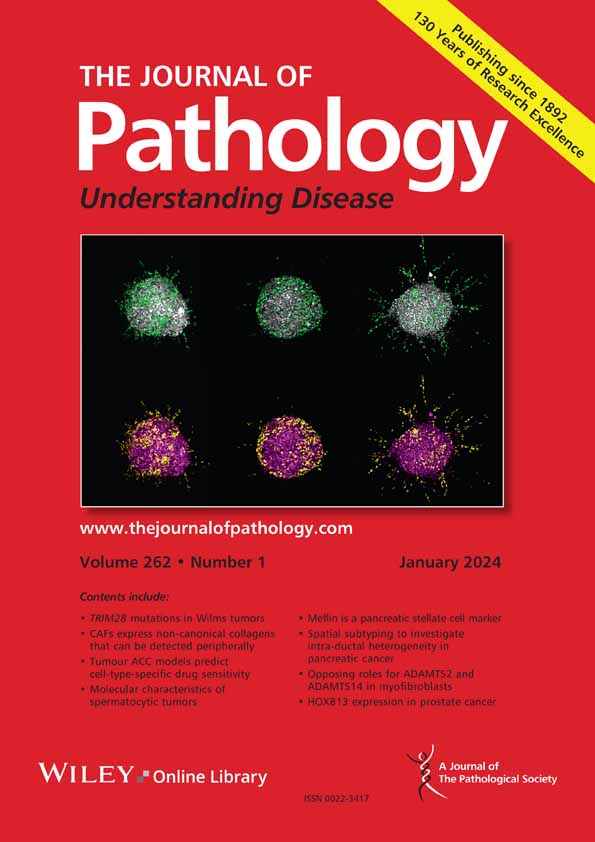Jingyu Zang, Ruiyun Zhang, Di Jin, Feng Xie, Akezhouli Shahatiaili, Guangyu Wu, Yue Zhang, Zhixin Zhao, Pan Du, Shidong Jia, Haige Chen, Guanglei Zhuang
求助PDF
{"title":"Integrated longitudinal circulating tumor DNA profiling predicts immunotherapy response of metastatic urothelial carcinoma in the POLARIS-03 trial","authors":"Jingyu Zang, Ruiyun Zhang, Di Jin, Feng Xie, Akezhouli Shahatiaili, Guangyu Wu, Yue Zhang, Zhixin Zhao, Pan Du, Shidong Jia, Haige Chen, Guanglei Zhuang","doi":"10.1002/path.6166","DOIUrl":null,"url":null,"abstract":"<p>Non-invasive biomarkers for immunotherapy response remain a compelling unmet medical need. POLARIS-03 is a multicenter phase II trial to evaluate the safety and efficacy of toripalimab (anti-programmed cell death 1) in refractory metastatic urothelial carcinoma (mUC). We assessed the predictive utility of longitudinal circulating tumor DNA (ctDNA) analysis from a single-institution biomarker cohort. Twenty-seven mUC patients receiving toripalimab (3 mg/kg Q2W) at Ren Ji Hospital were enrolled. Serial plasma specimens were obtained at baseline and then every two cycles during treatment. The 600-gene panel (PredicineATLAS™) liquid biopsy assay was applied to probe somatic variants and cancer cell fraction (CCF). Low-pass whole genome sequencing was used to determine the copy number abnormality (CNA) score. Across the entire cohort, we observed different degrees of concordance between somatic aberrations detected by ctDNA and those inferred by matched tumor samples. Although the baseline CCF or CNA had limited predictive value, early ctDNA response at week 8 was associated with toripalimab efficacy and prolonged patient survival. Integrating CCF and CNA decrease achieved a superior accuracy of 90.5% in classifying responders and non-responders and predicted long-term benefit from toripalimab. Dynamic changes in the CCF and CNA in blood exquisitely reflected radiographic assessment of malignant lesions, including those with <i>FGFR3</i>–<i>TACC3</i> gene fusion or microsatellite instability. This study demonstrates the feasibility and effectiveness of integrated longitudinal ctDNA profiling as a potential biomarker in mUC patients undergoing immunotherapy and supports further clinical evaluation of minimally invasive liquid biopsy assays for treatment stratification and therapy monitoring. © 2023 The Pathological Society of Great Britain and Ireland.</p>","PeriodicalId":232,"journal":{"name":"The Journal of Pathology","volume":"261 2","pages":"198-209"},"PeriodicalIF":5.6000,"publicationDate":"2023-08-16","publicationTypes":"Journal Article","fieldsOfStudy":null,"isOpenAccess":false,"openAccessPdf":"","citationCount":"0","resultStr":null,"platform":"Semanticscholar","paperid":null,"PeriodicalName":"The Journal of Pathology","FirstCategoryId":"3","ListUrlMain":"https://onlinelibrary.wiley.com/doi/10.1002/path.6166","RegionNum":2,"RegionCategory":"医学","ArticlePicture":[],"TitleCN":null,"AbstractTextCN":null,"PMCID":null,"EPubDate":"","PubModel":"","JCR":"Q1","JCRName":"ONCOLOGY","Score":null,"Total":0}
引用次数: 0
引用
批量引用
Abstract
Non-invasive biomarkers for immunotherapy response remain a compelling unmet medical need. POLARIS-03 is a multicenter phase II trial to evaluate the safety and efficacy of toripalimab (anti-programmed cell death 1) in refractory metastatic urothelial carcinoma (mUC). We assessed the predictive utility of longitudinal circulating tumor DNA (ctDNA) analysis from a single-institution biomarker cohort. Twenty-seven mUC patients receiving toripalimab (3 mg/kg Q2W) at Ren Ji Hospital were enrolled. Serial plasma specimens were obtained at baseline and then every two cycles during treatment. The 600-gene panel (PredicineATLAS™) liquid biopsy assay was applied to probe somatic variants and cancer cell fraction (CCF). Low-pass whole genome sequencing was used to determine the copy number abnormality (CNA) score. Across the entire cohort, we observed different degrees of concordance between somatic aberrations detected by ctDNA and those inferred by matched tumor samples. Although the baseline CCF or CNA had limited predictive value, early ctDNA response at week 8 was associated with toripalimab efficacy and prolonged patient survival. Integrating CCF and CNA decrease achieved a superior accuracy of 90.5% in classifying responders and non-responders and predicted long-term benefit from toripalimab. Dynamic changes in the CCF and CNA in blood exquisitely reflected radiographic assessment of malignant lesions, including those with FGFR3 –TACC3 gene fusion or microsatellite instability. This study demonstrates the feasibility and effectiveness of integrated longitudinal ctDNA profiling as a potential biomarker in mUC patients undergoing immunotherapy and supports further clinical evaluation of minimally invasive liquid biopsy assays for treatment stratification and therapy monitoring. © 2023 The Pathological Society of Great Britain and Ireland.
在POLARIS-03试验中,综合纵向循环肿瘤DNA谱预测转移性尿路上皮癌的免疫治疗反应
免疫治疗反应的非侵入性生物标志物仍然是一个令人信服的未满足的医疗需求。POLARIS-03是一项多中心II期临床试验,旨在评估托利哌单抗(抗程序性细胞死亡1)治疗难治性转移性尿路上皮癌(mUC)的安全性和有效性。我们评估了来自单一机构生物标志物队列的纵向循环肿瘤DNA (ctDNA)分析的预测效用。在任济医院接受托帕利单抗(3mg /kg Q2W)治疗的mUC患者27例。在基线时进行连续血浆标本采集,然后在治疗期间每两个周期采集一次。600基因面板(PredicineATLAS™)液体活检检测用于检测体细胞变异和癌细胞分数(CCF)。采用低通全基因组测序法测定拷贝数异常(CNA)评分。在整个队列中,我们观察到ctDNA检测到的体细胞畸变与匹配肿瘤样本推断的体细胞畸变之间存在不同程度的一致性。尽管基线CCF或CNA的预测价值有限,但第8周的早期ctDNA应答与托帕利单抗疗效和延长患者生存期相关。综合CCF和CNA降低在分类反应者和无反应者方面取得了90.5%的优异准确性,并预测了托利莫单抗的长期获益。血液中CCF和CNA的动态变化精确地反映了恶性病变的影像学评估,包括FGFR3-TACC3基因融合或微卫星不稳定。本研究证明了综合纵向ctDNA分析作为mUC患者接受免疫治疗的潜在生物标志物的可行性和有效性,并支持微创液体活检检测用于治疗分层和治疗监测的进一步临床评估。©2023英国和爱尔兰病理学会。
本文章由计算机程序翻译,如有差异,请以英文原文为准。

 求助内容:
求助内容: 应助结果提醒方式:
应助结果提醒方式:


